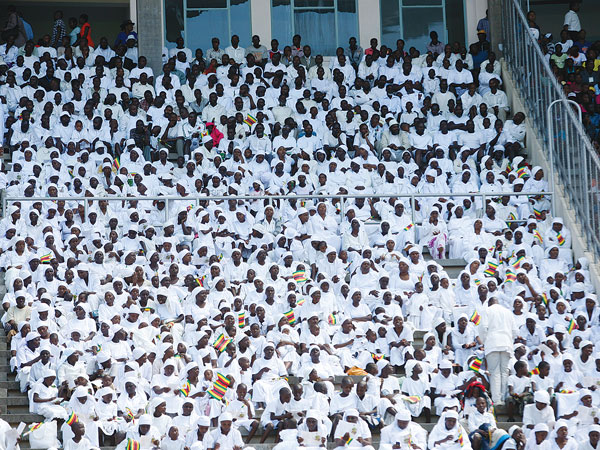
A STUDY recently released by think-tank the Research and Advocacy Unit (RAU) has revealed that members of the religious apostolic sect (Vapostori) are mostly affiliated to the ruling Zanu PF party, resulting in their voting patterns greatly influencing the outcome of Zimbabwe’s elections.
BY VENERANDA LANGA
The report, titled Religion and Politics in Zimbabwe, also described the Vapostori as having less political fear than most Zimbabweans.
“Members of the apostolic churches do have stronger support for Zanu PF than other churches and are a very distinct group from all other religions,” the RAU report read in part.
“They have significantly greater social capital, less political fear, and greater political trust,” they said.
The report said the Vapostori were likely to vote Zanu PF than the opposition mainly due to their rural location.
The Inter-Censal Demographic Survey (ICDS 2017) revealed that of the 84% Zimbabweans that are Christian, 34% were Apostolic, 20% Pentecostal, and 16% Protestant.
ICDS said of the remaining 30%, the Catholics constituted 8%, followed by those in traditional religion 5%, while the remaining 17% were distributed through other small religions, with 10% stating no religious affiliation.
- Chamisa under fire over US$120K donation
- Mavhunga puts DeMbare into Chibuku quarterfinals
- Pension funds bet on Cabora Bassa oilfields
- Councils defy govt fire tender directive
Keep Reading
“Clearly, Apostolics are the largest religious group and, if partisan affiliated, can have a significant effect on the outcome of an election. When it comes to political participation such as voting, Apostolics are merely a sub-group of the general rural population, and it is this population that demonstrates affiliation for Zanu PF rather than the MDC. At least, this was so in February 2017, but it also seems fair to conclude that not all members of the Apostolic churches will support or vote for Zanu PF.”
RAU said 47% of the sampled population of Vapostori in their study were reticent about stating whether they were close to a political party, while 32% were similarly reticent about stating which political party they voted for.
“There is a common assumption that the apostolic churches, the Vapostori, represent a “captured” constituency for Zanu PF when it comes to elections. This is undoubtedly a story with some truth to it, but rarely examined in any analytical fashion. The assumption probably derives some support from the notion that the Apostolic churches take their support from a largely rural population as well as from the poorer sections of Zimbabwean society,” the RAU report said.
“For example, on the ICDS data, it can be assumed that since there were 5 575 659 voters on the final biometric voters’ roll, this would mean that nearly two million (1 890 148) of these were ‘Apostolic’, and, if partisan to only one party, then it is a huge advantage for that party. If we take the lower, Afrobarometer, rate (12,2%); then the advantage is rather less, 680 230 ‘Apostolics’, but still a significant factor in a very close election.”
Zanu PF leaders have in the past trooped to Apostolic sects, seeking their support in polls. In the run-up to the July 30 2018 elections, the Apostolic Christian Council of Zimbabwe rallied its members to support President Emmerson Mnangagwa, saying the country would undergo socio-economic transformation under his stewardship.











